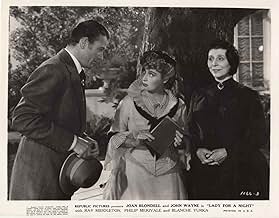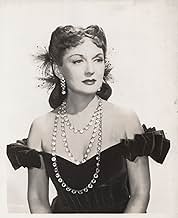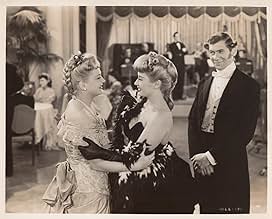CALIFICACIÓN DE IMDb
6.0/10
672
TU CALIFICACIÓN
Agrega una trama en tu idiomaGambling boat operator Jenny Blake throws over her gambler beau Jack Morgan in order to marry into high society.Gambling boat operator Jenny Blake throws over her gambler beau Jack Morgan in order to marry into high society.Gambling boat operator Jenny Blake throws over her gambler beau Jack Morgan in order to marry into high society.
- Dirección
- Guionistas
- Elenco
Hall Johnson Choir
- Singers
- (as The Hall Johnson Choir)
Fred Aldrich
- Member of Quartet
- (sin créditos)
- Dirección
- Guionistas
- Todo el elenco y el equipo
- Producción, taquilla y más en IMDbPro
Opiniones destacadas
The prior review was excellent. But the movie is set in Memphis not New Orleans, even though the Mardi Gras opening would belie that. And Joan Blondell's character is the one who proposes the marriage, not the other way around. All in all, it's very entertaining movie which deserves a better reputation.
In this costume comedy-drama set in late 19th century Memphis, gambling hall proprietress Jenny Blake (Joan Blondell) has great wealth but no respect among the snobs in high society. Politician Jackson Morgan (John Wayne) doesn't care about Jenny's reputation, loving her regardless, but his feelings aren't reciprocated, and Jenny marries alcoholic Alan Alderson (Ray Middleton) in order to gain social acceptance, while the Alderson clan want access to Jenny's fortune, having lost theirs in the Civil War. The disapproving Julia (Blanche Yurka) does everything in her power to undermine Jenny's efforts.
The first scenes of the film seem like many other 19th century set pictures where a brash guy tries to romance an equally brassy gal. Things change a bit when Blondell marries and heads to the country estate, where the many similarities to Rebecca begin, with a dark and dour female presence (Blanche Yurka), a deadly secret from the past, and even rumors of ghosts. The movie is hard to take with the drastic shifts in tone from farcical humor to dramatic tension, then on to (a lot) of bad racial jokes and references (Wayne threatens to send a maid "back to Africa" and there are quite a few slurs). It seems like the producers just tried throwing everything into a blender and hoped something potable came out. It sort of did, but you wouldn't want to drink deeply. The movie is saved from failure by the talents of the two leads, Blondell still a sharp cookie even if the waistline was starting to grow, and Wayne was showing much improvement in his acting abilities.
The first scenes of the film seem like many other 19th century set pictures where a brash guy tries to romance an equally brassy gal. Things change a bit when Blondell marries and heads to the country estate, where the many similarities to Rebecca begin, with a dark and dour female presence (Blanche Yurka), a deadly secret from the past, and even rumors of ghosts. The movie is hard to take with the drastic shifts in tone from farcical humor to dramatic tension, then on to (a lot) of bad racial jokes and references (Wayne threatens to send a maid "back to Africa" and there are quite a few slurs). It seems like the producers just tried throwing everything into a blender and hoped something potable came out. It sort of did, but you wouldn't want to drink deeply. The movie is saved from failure by the talents of the two leads, Blondell still a sharp cookie even if the waistline was starting to grow, and Wayne was showing much improvement in his acting abilities.
While I like both Joan Blondell and John Wayne, that wasn't enough for me to give this movie a higher rating. The costumes were gorgeous, and I loved the settings (the late 1860's had a certain visual charm), but the story left a lot to be desired.
The premise was good: casino owner Jenny Blake (Joan) wants to escape her lower class background and gain respectability, so she forsakes her boyfriend, Jack Morgan (John) and marries into the socially prominent but financially deficient Alderson family, trading her money for Alan Alderson's name and social connections. She soon finds out she didn't get the best of the bargain, as Alan's an alcoholic, and his family consists of his snobbish, angry father, his sour faced, domineering Aunt Julia, and his mentally vague (though kindly) Aunt Katherine. Jenny's not welcomed, made to feel like an outcast, and kept away from the very people she wanted to impress. She also senses there's more going on in this peculiar family than anyone will admit, though she gets some cryptic hints from Katherine.
Where the movie fails, is in its inability to make up its mind whether to be a musical (there are several numbers performed on the riverboat casino and at the Alderson mansion), a romance, a mystery or a gothic horror story. By trying to be a little of each, it accomplished even less. I guess you could call this a jack-of-all-trades-master-of-none movie.
It has its saving graces. The musical numbers were good, and there was an exciting chase scene, as Jack races to save Jenny, when she loses control of her carriage, unaware of the horses's impaired vision. There were a couple of black servants (Hattie Noel and Lew Payton) who gave the story some comic moments.
Not a bad movie, but it could have been better.
The premise was good: casino owner Jenny Blake (Joan) wants to escape her lower class background and gain respectability, so she forsakes her boyfriend, Jack Morgan (John) and marries into the socially prominent but financially deficient Alderson family, trading her money for Alan Alderson's name and social connections. She soon finds out she didn't get the best of the bargain, as Alan's an alcoholic, and his family consists of his snobbish, angry father, his sour faced, domineering Aunt Julia, and his mentally vague (though kindly) Aunt Katherine. Jenny's not welcomed, made to feel like an outcast, and kept away from the very people she wanted to impress. She also senses there's more going on in this peculiar family than anyone will admit, though she gets some cryptic hints from Katherine.
Where the movie fails, is in its inability to make up its mind whether to be a musical (there are several numbers performed on the riverboat casino and at the Alderson mansion), a romance, a mystery or a gothic horror story. By trying to be a little of each, it accomplished even less. I guess you could call this a jack-of-all-trades-master-of-none movie.
It has its saving graces. The musical numbers were good, and there was an exciting chase scene, as Jack races to save Jenny, when she loses control of her carriage, unaware of the horses's impaired vision. There were a couple of black servants (Hattie Noel and Lew Payton) who gave the story some comic moments.
Not a bad movie, but it could have been better.
OK, it wasn't an Academy Award winner. However, it did have many good elements to it. I'm not going to waste time telling you what it was about, you can read that in other comments. John Wayne was young and good looking, standing straight and tall. John Blondell was young and pretty. I remembered her in later movies after she had gotten older and a little heavier. Old man time sure beats the heck out of all of us.
Some people will raise and eyebrow at the plantation type scenes with the blacks dancing and singing. Did that go on? I don't know, but I wouldn't be surprised that after hard work in the fields, ANY people would be happy for the party time. Hattie Noel played the maid (Chloe) of Joan Blondell (Jenny). Chloe was funny and did an energetic job. Were these type parts demeaning for Blacks? Sure. But the way to look at it, is that it was the beginning of getting the foot in the door to show what you could do. There was a lot of talent in that singing and dancing. Nothing to be ashamed of, many a White person has played a demeaning part. The main thing is to showcase your talent. Hattie Noel may not have had the good fortune to be in Gone With The Wind, but she would have done quite nicely.
The best acting came from Edith Barrett who played the kinder Alderson sister Katherine. Some might call it overacting but I don't think that to be the case. You could feel her anguish between being torn by family loyalty, fear of her sister and doing the right thing. She gave a terrorized, impassioned performance.
Also enjoyable was John Blondell's singing performances as the part owner of the riverboat. In fact, she was so good that I wondered if a professional singer had dubbed her voice, even though I was aware of her own musical talents.
Blanche Yurka played the evil sister Julia, and how she could ooze evilness, with those eyes boring into anyone who crossed her. She hadn't changed much from her earlier days as Madame Defarge in A Tale of Two Cities.
Leonid Kinskey played John Wayne's bodyguard. Although Mr. Kinskey was always a good character actor (remember him as the funny bartender in Casablanca?), the reason for the part in the movie escapes me. I guess John Wayne needed a sidekick.
The rest of the cast was adequate, but nothing noteworthy that I can remember. Except of course for the can-can girls who really knew how to dance that thing with plenty of spirit.
OK, should you see it? If you have the movie or see it coming on the late show, no reason not to. The story is predicable and acting is adequate with a few who stand out as mentioned above. Don't watch it just to see John Wayne because the Duke was just being the Duke. And although the Duke is almost always fun to watch, this role didn't give him much room to do his thing. His part was overshadowed by larger parts going to Joan Blondell and the Alderson sisters. However, if you have the time, you will be entertained by a movie that is "not too bad" and "fairly enjoyable". There are some good acting parts and the singing and dancing routines are quite good too. I do not think you will be disappointed.
Some people will raise and eyebrow at the plantation type scenes with the blacks dancing and singing. Did that go on? I don't know, but I wouldn't be surprised that after hard work in the fields, ANY people would be happy for the party time. Hattie Noel played the maid (Chloe) of Joan Blondell (Jenny). Chloe was funny and did an energetic job. Were these type parts demeaning for Blacks? Sure. But the way to look at it, is that it was the beginning of getting the foot in the door to show what you could do. There was a lot of talent in that singing and dancing. Nothing to be ashamed of, many a White person has played a demeaning part. The main thing is to showcase your talent. Hattie Noel may not have had the good fortune to be in Gone With The Wind, but she would have done quite nicely.
The best acting came from Edith Barrett who played the kinder Alderson sister Katherine. Some might call it overacting but I don't think that to be the case. You could feel her anguish between being torn by family loyalty, fear of her sister and doing the right thing. She gave a terrorized, impassioned performance.
Also enjoyable was John Blondell's singing performances as the part owner of the riverboat. In fact, she was so good that I wondered if a professional singer had dubbed her voice, even though I was aware of her own musical talents.
Blanche Yurka played the evil sister Julia, and how she could ooze evilness, with those eyes boring into anyone who crossed her. She hadn't changed much from her earlier days as Madame Defarge in A Tale of Two Cities.
Leonid Kinskey played John Wayne's bodyguard. Although Mr. Kinskey was always a good character actor (remember him as the funny bartender in Casablanca?), the reason for the part in the movie escapes me. I guess John Wayne needed a sidekick.
The rest of the cast was adequate, but nothing noteworthy that I can remember. Except of course for the can-can girls who really knew how to dance that thing with plenty of spirit.
OK, should you see it? If you have the movie or see it coming on the late show, no reason not to. The story is predicable and acting is adequate with a few who stand out as mentioned above. Don't watch it just to see John Wayne because the Duke was just being the Duke. And although the Duke is almost always fun to watch, this role didn't give him much room to do his thing. His part was overshadowed by larger parts going to Joan Blondell and the Alderson sisters. However, if you have the time, you will be entertained by a movie that is "not too bad" and "fairly enjoyable". There are some good acting parts and the singing and dancing routines are quite good too. I do not think you will be disappointed.
Joan Blondell delivers something of a feisty Stanwyck-style character in her depiction of successful river boat owner "Jenny". Together with her local kingpin co-partner "Jackson" (John Wayne) they make a good living from the great and the good of Tennessee society. The thing is, though, "Jenny" has ambitions to join that society. She craves respectability and when an opportunity to marry into the "Alderson" family presents itself, she doesn't think twice. Her new husband "Alan" (Ray Middleton) is a bit of a drunk, but his family need her money so unwillingly tolerate her. All except, "Julia" (Blanche Yurka) who really does look down her nose at her new in-law. The more "Jenny" tries, the more cleverly antagonistic her nemesis becomes until finally murder ensues and the truth must out... It's a bit of an amalgam of stories this, and the really rather wooden Wayne features too sparingly to make much difference to the rather meandering drama. Hattie Noel has some fun as "Chloe" and there's a bit of toe-tapping mid way through but the rest of this is all just a little procedural with an expected twist right at the denouement. It's a good looking tale of rancour, envy, love and bitterness - but told in fashion you're not really likely to remember.
¿Sabías que…?
- TriviaThis film inspired the name of one of the most famous World War 2 bombers, the B-17 "Memphis Belle", one of the first to complete a full combat tour of 25 missions against targets in Nazi Germany in May 1943. The aircraft was the namesake of pilot Captain Robert K. Morgan's sweetheart, Margaret Polk, a resident of Memphis, Tennessee. Morgan originally intended to call the B-17, Little One, after his pet name for her, but after Morgan and his co-pilot, Jim Verinis, saw this movie in which the leading character owns a riverboat named the Memphis Belle, he proposed that name to his crew. After their combat service, the Belle and her crew were sent home on highly successful war bond tour. They were also featured in an award-winning 1944 documentary by William Wyler.
- Créditos curiososUnderneath the credits, there is some footage of extras dancing in front of the Alderson family's house.
- Bandas sonorasUp in a Balloon
(uncredited)
Written by Henry B. Farnie (1868)
Special Lyrics by Sol Meyer
Sung by Joan Blondell, a quartet and chorus on the Memphis Belle
Whistled by John Wayne
Played as backgroung music often
Selecciones populares
Inicia sesión para calificar y agrega a la lista de videos para obtener recomendaciones personalizadas
- How long is Lady for a Night?Con tecnología de Alexa
Detalles
- Tiempo de ejecución1 hora 27 minutos
- Color
- Relación de aspecto
- 1.37 : 1
Contribuir a esta página
Sugiere una edición o agrega el contenido que falta

Principales brechas de datos
By what name was Dama por una noche (1942) officially released in India in English?
Responda



































